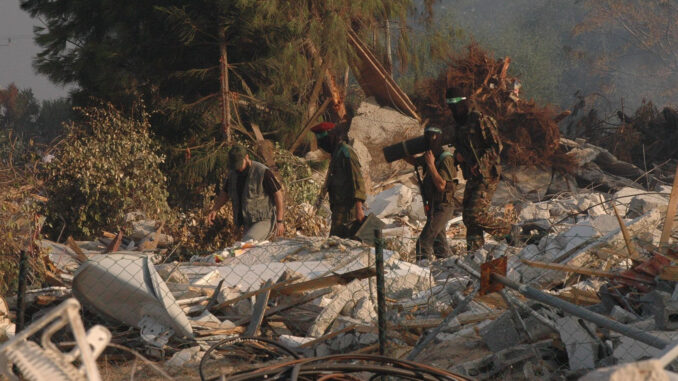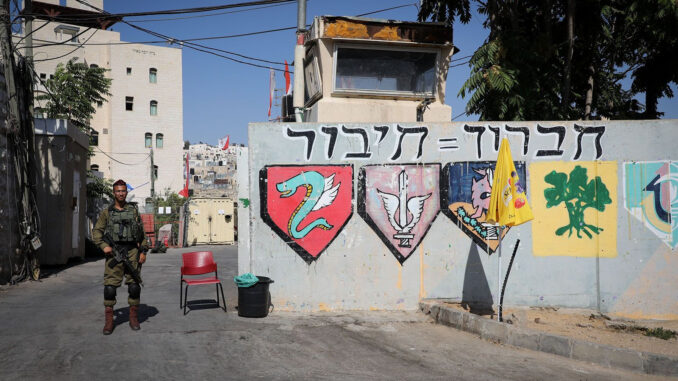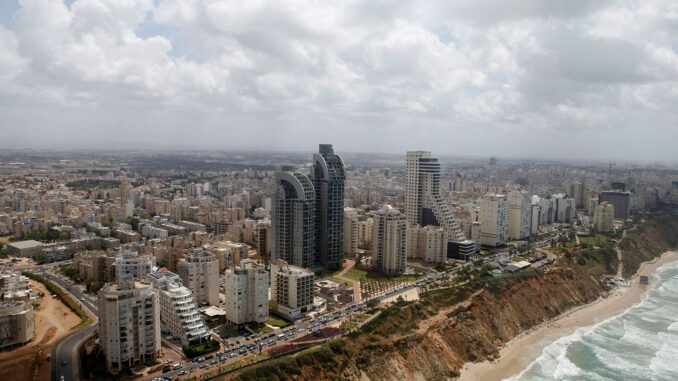T. Belman. Bercovici used to be the Canadian Ambassador to Israel. She now lives in Israel. She summarizes her bias by saying, “The erosion of liberal democratic principles is my top concern following Election #5, and it was heartening to learn that my perspective is shared by many on the other side of the Green Line.” What the hell are “liberal democratic principles”? Wikipedia says “Liberal democracy emphasizes the separation of powers, an independent judiciary and a system of checks and balances between branches of government.” That’s exactly what the Right wants. Its an insult to suggest otherwise.
BY Vivian Bercovivi, STATE OF TEL AVIV – 08 NOV 2022
Friday, November 4, 2022. At a West Bank settlement for Shabbat dinner.
I. Every time you cross the “Green Line,” the rough boundary separating Israel proper from the territories it has controlled since 1967, you feel “it.”
The population clusters are less dense, roads are less busy and street lighting is not quite as bright. I have travelled this road many times to visit friends who live on the other side.
Over the years, the Green Line has become like an inviolable article of religion among so many instant international law experts. At the end of the Six-Day War – in which Jordan attacked Israel on its eastern border – a ceasefire and terms were negotiated. In haste, on the battlefield, on a scrap piece of paper, a line was drawn with a green magic marker. It was cheap porous paper, the kind that ink seeps through when you write or draw on it.
It was not a fine line drawn with a Montblanc on crisp parchment.
There was also a demilitarized zone – DMZ, separating the warring nations. So many lines, in this sequence: Israel – Green Line – DMZ – Jordan. The precise boundary of the ceasefire, to the centimeter, is impossible to ascertain due to the challenging conditions. Cheap paper and green marker.
But the drawing served the immediate purpose. The Jordanian and Israeli armies accepted the “Green Line” as a guide to demarcate borders. [1]
II. I was a little late crossing the Green Line last Friday, having been tied up in nasty traffic leaving Tel Aviv.
So I missed the pre-dusk rush on these roads where remote settlements are almost exclusively home to those who keep the sabbath, meaning that they refrain from driving, among other things. It is the day of rest, when the religiously observant unplug, literally, and focus on family and replenishing the soul. In the hours leading up to sundown, the roads on this side of the Line are jammed with people rushing to get home in time to prepare the festive meal and scrub up. Flower vendors pop up on roadsides. There are no excuses to show up empty-handed.
I arrived after the sun had set and parked outside the settlement entry gates, which are closed each Friday afternoon before Shabbat begins. No local road traffic is permitted. The quiet is, actually, quite lovely. Streets are full of people walking to or from synagogue. Kids roam freely. There is a serenity in these communities that comes from common beliefs and lifestyles.
I love joining these particular friends at their home for Shabbat dinner, which I do not manage to do often enough. There are 20-30 people around the massive table each week. Their children are all in their teens and early 20s, so a separate “kids table” is no longer needed. Company is lively, irreverent, diverse and well-educated. English and Hebrew and Hebrish are spoken, depending on the moment, topic and who’s talking. And the homemade food is outstanding.
We had arranged this date well in advance, knowing that the election would be held a few days earlier, ensuring great conversation.
In addition to some kosher maple-leaf-shaped cream-filled cookies, I brought along assumptions about which I was supremely confident. It’s a settlement, I thought, so they all voted for the Religious Zionism party. The Smotrich-Ben Gvir duo, after all, surged significantly, taking 14 seats in Election #5, more than double what they earned in March 2021. An astonishing result. So, it seemed logical to me to presume that places like this settlement represented their hardcore vote.
Wrong.
III. According to my hosts and other residents who were at dinner – or joined later for after-dinner schnapps – this community supported Likud or Shas. Period.
Wow.
North American-raised Israelis made up a significant number in the room, but their children were born here. To a person, they expressed discomfort with the rhetoric, extremism and theatrics of the Smotrich-Ben Gvir team.

MK Itamar Ben Gvir, head of the Otzma Yehudit political party, and MK Bezalel Smotrich, Chairman of the Religious Zionism party, at an election campaign event in Sderot, October 26, 2022. (Photo by Flash90)
I had a fascinating chat with one young man, currently serving in an elite IDF intelligence unit, about the policy rationale and value of West Bank settlements, particularly those situated in areas with large Palestinian populations.
We discussed whether such settlements served national security interests or more “political” ends.
“If we did not have such communities with full IDF protection as a buffer,” he asked, “would we not then be forced to encircle cities and towns within the ‘Green Line’?” The question he asks presupposes this answer: Without “forward” placed settlements that require and justify a strong IDF presence, Israelis within the Green Line are buffered from security threats.
This, of course, has long been a key aspect of the security rationale for supporting the establishment of such settlements for decades.
Take the Gaza Strip, for example. Prior to the 2005 unilateral Israeli withdrawal from the area, there was virtually no significant military force on the ground in the area referred to since that time as the “Gaza envelope”; the land which is within the internationally recognized western border of Israel abutting the Gaza Strip. Land is a very precious commodity in Israel and not a meter is wasted. Fields are tilled right up to the hostile border and the same with highways and towns. There are no hectares left to lie fallow.
Since the 2005 withdrawal, many agricultural settlements in Israel sit right on the border with the Gaza Strip. And the area bristles with military activity, which is absolutely necessary to protect the civilian population from terror attacks.
The moment Israel pulled out, Palestinian leadership made it a priority to encourage the destruction of every vestige of an Israeli presence, including the technologically advanced greenhouses and other agricultural infrastructure that had been left intact.

Armed members of the Islamic Jihad Movement walk through the ruins of Neve Dekalim on September 12, 2005. (Photo by Yossi Zamir/Flash90)
Almost overnight, the Gaza Strip was transformed from a region that enjoyed a free flow of commerce and labor with Israel to a harsh, corrupt, militaristic theocracy. In addition to the imposition of an Islamist doctrine and way of life, Gaza was transformed into a jurisdiction whose main business is the production and importing of weapons. UNRWA resources were routinely diverted to terrorist activity. Becoming a jihadi warrior was the most promising career path and the communities near the new border between the Gaza Strip and Israel became the battlefront.
Until 2005, Sderot, a community of approximately 25,000, was a military afterthought. Overnight, it became the main target for Hamas and PIJ rockets, mortars and, over time, explosive balloon devices carried by wind and meant to maim and kill children. Usually, they landed in agricultural fields alighting fires that destroyed years of cultivation.
This nightmare scenario – that had transpired in the vicinity of the Gaza Strip – was exactly the issue my young acquaintance and I discussed last Friday night.
As an IDF intelligence soldier, he spends much of his time working indoors. But, every month or so his unit is dispatched for a few days to the field to provide security for Jewish communities situated in the West Bank – or Judea and Samaria. Recently, he spent some time in the Hebron area, a particularly tense and fraught location. Jews choosing to live there are considered to be extremist by some. Others see them as brave pioneers, residing in a hostile area in order to affirm, with a constant physical presence, the significance of Hebron – where the Jewish patriarchs and matriarchs are reportedly buried – to the essence of the Jewish nation, people and religion.

An Israeli soldier stands guard near an IDF base in the divided West Bank city of Hebron. September 4, 2019. (Photo by Gershon Elinson/Flash90)
The young soldier with whom I spoke had been moved by the settlers’ sense of purpose, community and selflessness. They have chosen to live in unrelentingly harsh and threatening circumstances out of a commitment, in their eyes, to the greater good of Israel. If they were not there, he asks, how might that affect a town like Modi’in, or Rosh Ha’Ayin, both of which rub up against the Green Line? Do the West Bank settlements serve as a military buffer between terrorism and Israeli civilians?
IV. The “Waist”
Many people do not realize, or they forget, that at its narrowest point – referred to as “the waist” – Israel is six miles wide from the Mediterranean Sea to the 1967 Green Line. And that impossible width, of course, aligns with the center of the country, where the majority of the population and commerce are concentrated.
Abba Eban, a former Israeli Ambassador to the United Nations and orator par excellence, referred once to the 1967 line as the “Auschwitz border,” meaning that if it was enforced it would ensure the annihilation of the Jewish people. No country could protect its civilians – never mind from constant threats – with such physical limitations.
When I was serving as Canada’s Ambassador to Israel, the Deputy Minister of Foreign Affairs (the equivalent of the Deputy Secretary of the State Department), Daniel Jean, made his first and only visit to Israel. He was unfamiliar with the Middle East and any briefings he received were from his Ottawa-based staff, who were and are known for their unfriendly attitude towards Israel.
I considered this an opportunity to educate someone in a powerful position and arranged for Daniel to take a short helicopter tour of the country with me, since his two-day stopover demanded efficiency. We were airborne from a helipad just outside of Jerusalem and took a quick circuit focusing on the central part of the country. But, Israel is really small. So, on a reasonably clear day, which we had, you can see far north and south.

The Netanya coast line is seen from the sky during the annual celebrations of Israel’s 65th Independence Day. April 16, 2013. (Photo by Flash90)
As the pilot neared Netanya, where the ’67 border is narrowest, I pointed out to Daniel where the Green Line ran as well as the outskirts of Ramallah, which was easily visible and where he had also visited. His jaw literally dropped. He looked at me: “That’s it?!”
“That’s it, Daniel,” I replied, biting my tongue. What I wanted to say was: “That’s it, Daniel. Six miles is six miles. No matter where you are. A pound of feathers weighs the same as a pound of rocks.”
He was promoted soon after by Prime Minister Justin Trudeau to the very powerful position of National Security Adviser.
Among many diplomats, academics and journalists – mere mention of the Green Line triggers mass neurosis. Lazy analysis and repetition of various lines over decades has convinced many that they are true. And so, whereas the Green Line was a triage boundary agreed upon to prevent Israel from closing in on Damascus, Cairo and Amman, many western diplomats have decided it was and is and shall be The Border.
It is an indefensible border, meaning that if it was the international demarcation between Israel and a Palestinian state, it would ensure the end of the Jewish state.
So, how then, does Israel treat the West Bank? The recently elected “right-wing bloc” regards this land as having been promised to the Jewish people by God. It is, quite literally, the promised land. It is also where so much Jewish history and presence is confirmed, to this day, by sites like the Tomb of the Patriarchs in Hebron as well as constant archeological discoveries.
Israeli settlement of the West Bank, of course, continues to roil the international community and, in fairness, a significant cohort of the Israeli population.
Then there is the realpolitik and security issues. Facts on the ground. Does Israel need full or partial control over the west bank in order to ensure sovereignty? And if Israel cedes control, on what terms and at what cost?
I do not know that there are any Israelis – left, center or right – who are pleased with the way in which the occupation has transpired. Some feel strongly that the West Bank should be formally annexed by Israel.
Others understand how this situation came to be but are uncomfortable with the status quo, ethically. Virtually all, however, are attuned to the security implications of simply withdrawing from the West Bank, an absurd proposition.
The Solomonic juggernaut: How does Israel manage this mess? Does it muddle along with the current arrangement? Does the status quo threaten liberal democracy? Does it promote extreme nationalism? Is there a solution short of civil war?
V. Itamar Ben Gvir
Itamar Ben Gvir, a very powerful political leader at the moment, is given to comparing Israel to the “landlord.” We are in charge in the West Bank and we will set and enforce the rules. This, the same Ben Gvir, who loves to brandish his pistol when he feels “threatened,” as he was recently by an elderly Arab parking lot attendant.
The Ben Gvir-Smotrich hardline stance on pretty much everything is applauded by many in the right-wing bloc as being an entirely legitimate and justifiable assertion of sovereignty. It may be. Let’s concede that point, for the sake of argument. But – is it ethical? Is it sustainable?
Turns out, much to my surprise, that many Israelis are leery of the Religious Zionism party’s militarism and theocratic tendencies. Once the word of God is invoked to justify any policy then there is no room to negotiate. The position is absolutist.
We live in the real world, where negotiation and compromise are necessary evils. I also live in the State of Israel, which was established as a liberal democracy. The erosion of liberal democratic principles is my top concern following Election #5, and it was heartening to learn that my perspective is shared by many on the other side of the Green Line.
We agreed on this: that the stakes are existential and will determine the course and values of Israel in the coming decades and, possibly, centuries.
Dinner, by the way, was spectacular.



The Jews of Israel have to deal with the lies of the antisemitic west, for example “occupation”. Do you occupy your living room or your bedroom or your bed? No you own them. God gave Israel to the Jews. Period! As for giving up land, How do you like missile attacks every hour of every day? Remember the Missiles raining down on Tel Aviv or Ben Gurion Airport? How about the stabbing attacks in Jerusalem or Tel Aviv? There is no solution but to accept what God requires and kick the non Jews out of the land of Israel. If they want war carpet bomb them and their supporter to HELL. (The EU may already be in HELL this Winter with the US following in the Spring.)
You will NEVER have peace with Islam! Islam do not compromise and they never will! Whoever do, shall perished. But you keep trying at your own risk. Ben Gvir is the only way. Take it from this Sephardi jew who was born in an arab country and had to LEAVE pennyless. Meir Kahane was right…
Bercovici is confused. The greenline was the cease fire line ending the War of Independence in 1949. It gave us much more land than the Partition Plan allowed us… It is sometimes referred to as the ’67 lines before the Six Day War. Obama pushed for a two state solution based on the ’67 lines with minor adjustments. It was also the demand of the Islamic states.